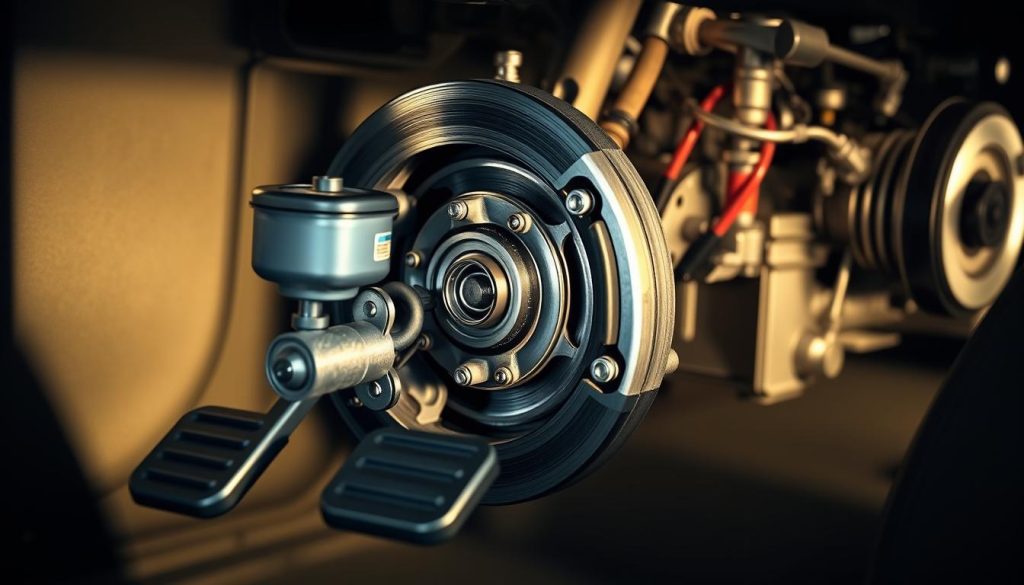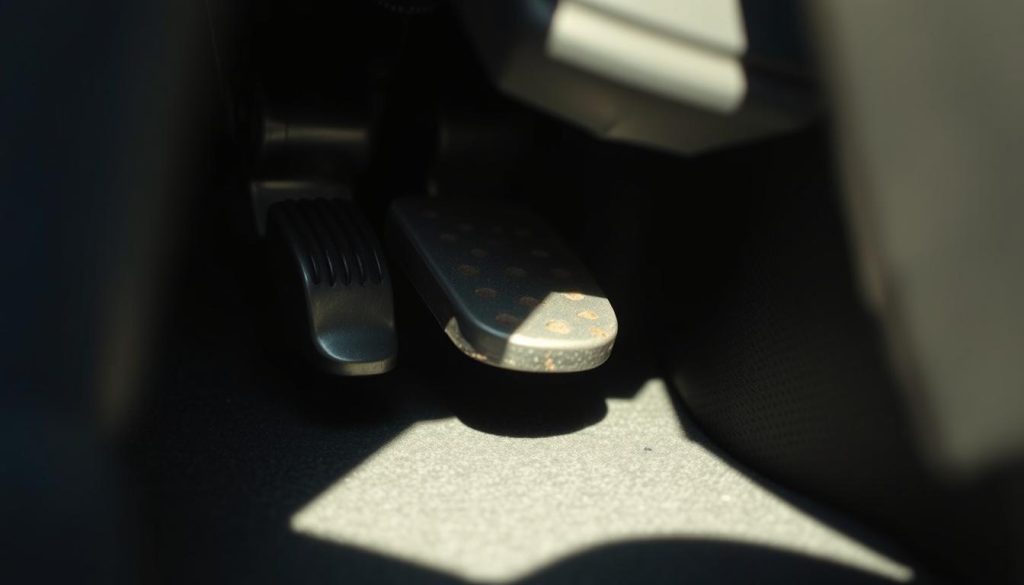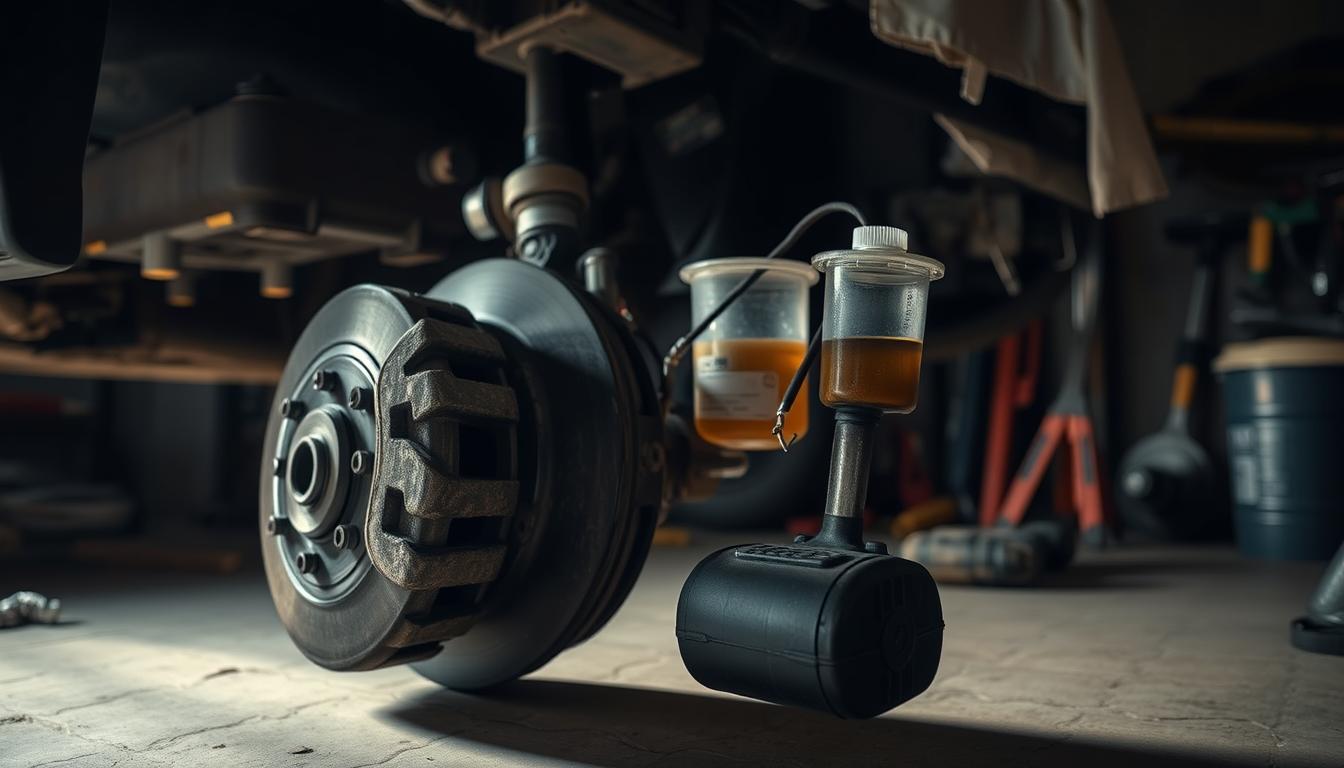A spongy brake pedal often means there’s a problem with your car’s brakes. When you press the brake pedal, it should feel solid and steady. But if it’s soft or spongy, it’s a clear sign something’s wrong.
At Heaven Automotive, we know how vital a good braking system is. A spongy pedal can warn of brake failures. If you see this, get your car checked right away.
We’re here to find and fix any brake issues. Our team at Heaven Automotive is committed to keeping you safe on the road.
Key Takeaways
- A spongy brake pedal indicates a potential problem with the braking system.
- A firm and consistent brake pedal is essential for safe driving.
- Immediate inspection is recommended if the brake pedal feels soft or spongy.
- Heaven Automotive can diagnose and fix braking system issues.
- A well-functioning braking system is crucial for vehicle safety.
Understanding Low Brake Pedal Feel
A low brake pedal feel is not just a minor issue. It’s a sign of possible brake problems that could affect your safety and car’s performance. When you press the brake pedal, you should feel a firm response. But if it feels spongy or soft, it means there’s a problem with your brakes.
What is a Spongy Brake Pedal?
A spongy brake pedal feels soft or mushy when pressed. It often needs more pressure or pumping to stop the car. This can happen for many reasons, affecting your brake system’s integrity.

Common Causes of Low Brake Pedal Feel
Several factors can cause a low brake pedal feel. Here are some common ones:
- Air in the Brake Lines: Air bubbles in the brake fluid make the pedal feel soft. Air compresses more easily than brake fluid.
- Low Brake Fluid Level: Not enough brake fluid lets air into the system, causing a spongy pedal.
- Leaking or Damaged Brake Lines: Leaks or damage to brake lines can lower hydraulic pressure. This makes the pedal feel low.
- Worn-out Master Cylinder: A worn-out master cylinder can’t generate enough pressure. This leads to a spongy pedal.
Symptoms to Watch For
Knowing the symptoms of a low brake pedal feel is key to diagnosing the problem. Look out for these signs:
- A sinking or soft brake pedal that needs more pressure to stop.
- Brake warning lights on the dashboard that won’t turn off.
- Needing to pump the brakes to slow down or stop.
- Unusual noises when applying the brakes.
Being aware of these symptoms helps you fix brake issues quickly. If you see any of these signs, get your brakes checked by a professional mechanic.
Safety Implications of Ignoring Brake Issues
A spongy brake pedal is not just a minor issue; it can significantly impact your vehicle’s safety. Ignoring brake issues risks your safety and the safety of others on the road.
How a Spongy Brake Pedal Affects Vehicle Control
A spongy brake pedal can lead to increased stopping distances and reduced vehicle control. This is because a spongy pedal often indicates air in the brake system or worn-out brake pads. These issues can compromise your ability to stop the vehicle effectively.
- Increased risk of accidents due to longer stopping distances
- Reduced control over the vehicle, making emergency braking harder
- Potential for brake failure, leading to severe consequences

Potential Risks if Issues Are Not Addressed
If brake issues are not addressed, the risks can be severe. Driving a vehicle with a spongy brake pedal is not recommended. It compromises the car’s braking ability on the road. The potential risks include:
- Accidents caused by the inability to stop the vehicle in time
- Increased wear on other brake components, leading to costly repairs
- Compromised safety for both the driver and other road users
It’s crucial to have your brakes diagnosed by a professional if you notice any issues. A proper brake diagnosis can identify problems early, ensuring your safety on the road. Remember, a Low Brake Pedal Feel is a sign that your vehicle needs attention.
When to Seek Professional Help for Brake Issues
If you notice a spongy brake pedal, you should act fast. Signs that mean you need a pro include a pedal that feels soft, brake lights that won’t turn off, or a pedal that sinks. These could mean air in the lines or a bad master cylinder.
Signs You Should Hire a Mechanic
Seeing these symptoms means it’s time to see a mechanic. Not fixing these problems can make things worse. It could make your car unsafe and affect how well it runs.
How Heaven Automotive Can Help
At Heaven Automotive, our experts can find and fix brake problems. We can spot issues like air in the lines or a faulty master cylinder. Then, we’ll fix it so your car is safe and works right.
Our Commitment to Vehicle Safety and Performance
We aim to give top-notch service to keep your brakes in great shape. If you’re having brake trouble, bring your car to Heaven Automotive. Call us today to set up your visit. Let us make sure you can drive safely.

